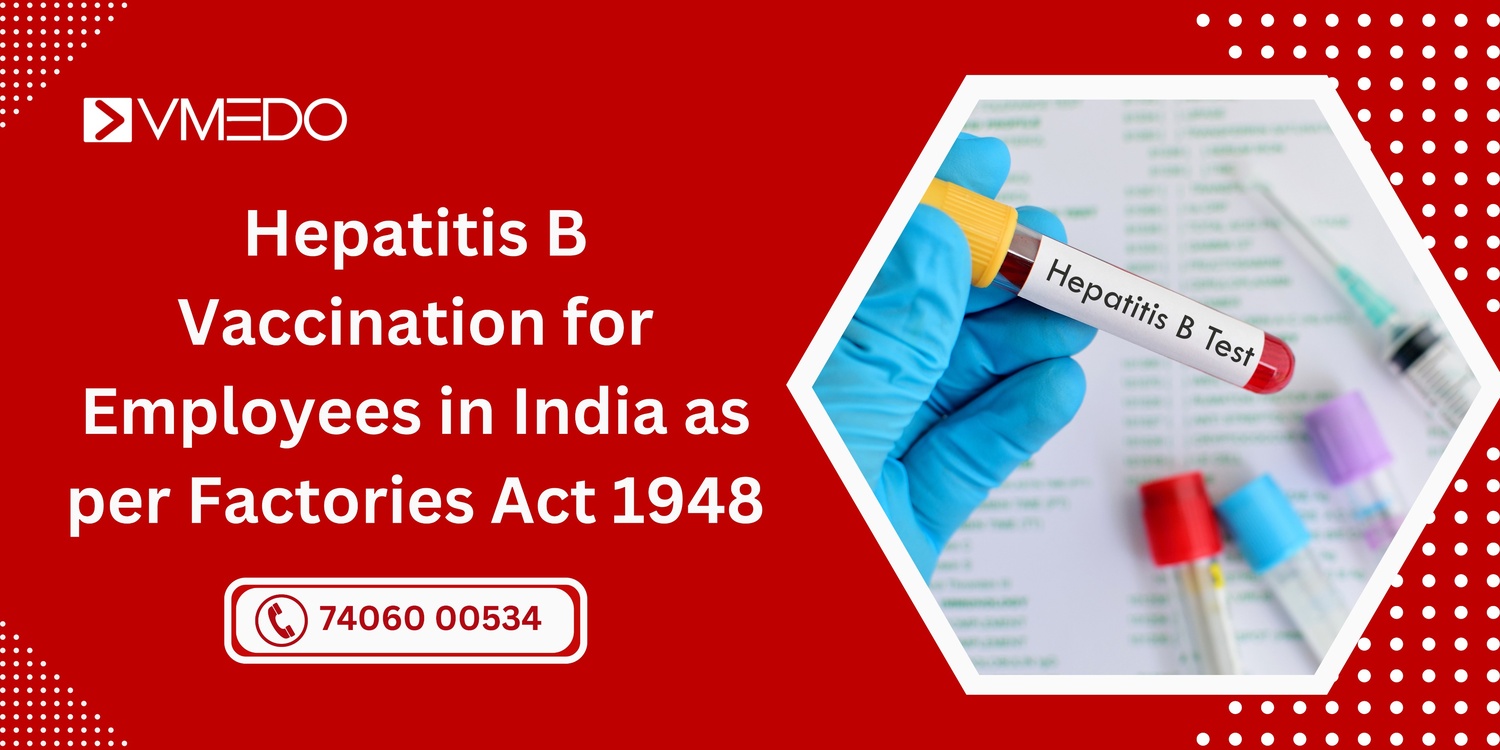Hepatitis B is a serious liver infection caused by the Hepatitis B virus (HBV). It poses a significant public health challenge, particularly in workplaces where employees may be exposed to blood or bodily fluids, such as healthcare, manufacturing, and hospitality industries. Employers play a critical role in safeguarding employee health, and vaccination is a proven way to prevent the spread of Hepatitis B. Partner with VMEDO to organize seamless Hepatitis B vaccination drives for your employees, ensuring a healthier workforce and a safer workplace. Contact us today at +91 74060 00534 to prioritize your team’s health and safety!
What is Hepatitis B?
Hepatitis B is a viral infection that attacks the liver. It can lead to acute illness, but in some individuals, the virus can remain in the body for years, leading to chronic liver disease. The Hepatitis B virus is transmitted through direct contact with an infected person’s blood or bodily fluids, making it highly contagious. The virus can be spread through:
- Unprotected sex with an infected person
- Sharing needles or other drug paraphernalia
- Accidental needle-stick injuries in healthcare settings
- From mother to child during childbirth
- Contact with open sores or blood from an infected individual
While Hepatitis B can often be asymptomatic, it has the potential to cause severe long-term liver damage, including cirrhosis (scarring of the liver), liver failure, and liver cancer. Globally, it is one of the leading causes of death, particularly in regions where the infection rate is higher, including parts of Asia and Africa.
Importance of Hepatitis B Vaccination for Employees
1. Reducing Risk in High-Risk Workplaces
Employees in healthcare, emergency services, and laboratory settings are at a higher risk due to potential exposure to infected blood. Vaccination is critical in mitigating risks, especially in regions like India with a high incidence of Hepatitis B.
2. Protecting Employee Health
Vaccinated employees are less likely to develop chronic liver diseases, reducing long-term healthcare costs and improving overall well-being.
3. Preventing Workplace Transmission
Vaccination safeguards both individuals and their coworkers by curbing the spread of the virus in close-contact environments.
Vaccination Protocol for Hepatitis B
- Dosage Schedule:
- The vaccine is administered in three doses over six months.
- The first dose is followed by the second dose after one month and the third dose after six months.
- Eligibility:
- All unvaccinated employees, especially those in high-risk roles.
- Employees with no prior history of Hepatitis B infection or vaccination.
- Booster Shots:
- Not usually recommended for individuals with a strong immune response after the initial vaccination series.
Steps for Employers to Implement a Hepatitis B Vaccination Program
- Employee Awareness Campaign:
- Educate employees about the risks of Hepatitis B and the benefits of vaccination.
- Conduct seminars or share informative materials through emails or notice boards.
- Health Check-Up:
- Arrange pre-vaccination screening to check for existing immunity or infection.
- Vaccination Drive:
- Partner with healthcare providers like VMEDO to organize on-site vaccination camps.
- Ensure adherence to the proper vaccination schedule.
- Record Maintenance:
- Maintain vaccination records for all employees for future reference and compliance purposes.
- Post-Vaccination Support:
- Monitor employees for any side effects.
- Provide guidance on follow-up doses.
Risks of Not Vaccinating Employees Against Hepatitis B
- Increased Workplace Infections: Higher chances of virus spread in high-risk industries.
- Productivity Loss: Illness-related absences disrupt workflows.
- Reputational Damage: Outbreaks due to neglect of employee health can tarnish a company’s image.
- Legal Liability: Potential lawsuits for not ensuring workplace safety.
Hepatitis B Vaccination Guidelines for Employees in India
1. Vaccination Schedule
The Hepatitis B vaccine is administered in a series of three shots. The typical schedule is:
- First Dose: Administered at a convenient time.
- Second Dose: Administered 1 month after the first dose.
- Third Dose: Administered 6 months after the first dose.
This schedule ensures optimal protection, with immunity developing approximately 1 to 2 months after the final dose.
2. Vaccination for Specific High-Risk Groups
While the vaccine is generally recommended for all individuals, certain groups of employees should be prioritized, especially those working in environments where they are more likely to be exposed to the virus. These groups include:
- Healthcare Workers: Doctors, nurses, lab technicians, and hospital staff who come into contact with blood or other bodily fluids are at high risk of exposure.
- Emergency Services Personnel: Paramedics, firefighters, and police officers who may be exposed to blood through accidents or violence.
- Manufacturing and Construction Workers: Workers in these sectors who handle sharp objects or work in conditions where exposure to blood is a risk.
- Waste Management Workers: Employees who deal with potentially contaminated waste may also be at risk.
- Staff Working with At-Risk Populations: This includes those working in orphanages, correctional facilities, and refugee camps.
3. Post-Vaccination Testing
After completing the vaccination series, it is advisable to conduct a blood test to confirm that the employee has developed adequate immunity to the virus. This can be done by measuring the level of antibodies in the blood. If the employee has not developed immunity, they may need a booster dose or additional doses.
Benefits of Hepatitis B Vaccination for Employers
Implementing a Hepatitis B vaccination program offers numerous benefits to employers. These include:
- Reduced absenteeism: Healthy employees are less likely to take sick leave due to liver-related illnesses.
- Improved productivity: Healthy workers are more productive and contribute to a positive work environment.
- Lower healthcare costs: Preventing Hepatitis B-related illnesses can reduce healthcare expenses and long-term treatment costs.
- Legal compliance: Employers in certain sectors may be legally obligated to offer Hepatitis B vaccination to employees, particularly those in healthcare and high-risk settings.
Industries That Should Prioritize Hepatitis B Vaccination
- Healthcare Sector: Doctors, nurses, lab technicians, and paramedics are at the highest risk due to frequent exposure to blood and bodily fluids.
- Pharmaceutical and Biotech: Employees handling biological samples or working with HBV-related research.
- Manufacturing: Workers in industries where injuries are common, increasing potential exposure to infected blood.
- Hospitality: Staff dealing with sanitation or waste management.
- Corporate Offices: Ensures general employee health and safety, especially in large setups.
Cost of Hepatitis B Vaccination in India
- The cost of a single dose ranges between ₹300 to ₹500 in private clinics.
- Bulk vaccination drives for organizations may reduce costs per dose.
- Organizations should consider partnering with healthcare service providers to ensure cost-effective vaccination programs.
- cost-effective vaccination programs.
VMEDO Services
- Annual Health Checkups for Employees (Factories Act Compliance)
- Pre-Employment Health Checkups in India
- Lung Function/PFT Tests for Employees in India
- Blood Tests for Employees (Factories Act Compliance) in India
- ECG Tests for Employees in India
- Audiometry Tests for Employees in India
- Eye/Vision Tests for Employees in India
- Medical Fitness Certificates (Factories Act Compliance) in India
- HIV/HBs Tests for Employees in India
- Chest X-Rays for Employees in India
- Hepatitis B Vaccinations in India
- HPV Vaccinations in India
- Tetanus (TT) Vaccinations in India
- Influenza Vaccination for Employees in India
- Pneumococcal Vaccination for Employees in India
Frequently Asked Questions (FAQs): Hepatitis B Vaccination for Employees
- What is Hepatitis B, and how is it transmitted?
Hepatitis B is a viral infection that affects the liver. Infected blood or bodily fluids transmit it through direct contact, such as during unprotected sex, sharing needles, or accidental needle-stick injuries. - Why is Hepatitis B vaccination important for employees?
Vaccination prevents the spread of the Hepatitis B virus, protecting employees from severe liver complications like cirrhosis, liver failure, and cancer. - Who should get vaccinated against Hepatitis B?
- What is the vaccination schedule for Hepatitis B?
The vaccine is given in three doses over six months:
- First Dose: Anytime.
- Second Dose: 1 month after the first dose.
- Third Dose: 6 months after the first dose.
- Is post-vaccination testing required?
Yes, a blood test after the vaccination series confirms immunity. If immunity is insufficient, additional doses may be needed. - Are there any side effects of the Hepatitis B vaccine?
The vaccine is generally safe. Mild side effects like soreness at the injection site, fever, or fatigue may occur. - How can employers implement a Hepatitis B vaccination program?
Employers can:
- Conduct awareness campaigns.
- Partner with healthcare providers for vaccination drives.
- Arrange pre-vaccination screenings.
- Maintain vaccination records for compliance.
- What happens if employees are not vaccinated?
Unvaccinated employees are at higher risk of infection, leading to increased absenteeism, workplace outbreaks, and potential legal liabilities for the employer. - How much does the Hepatitis B vaccine cost in India?
The cost per dose ranges from ₹300 to ₹500. Bulk vaccination drives for organizations can lower costs. - How can VMEDO help with workplace vaccination?
VMEDO organizes on-site Hepatitis B vaccination drives, ensuring seamless execution and adherence to safety protocols. Contact +91 74060 00534 to schedule your vaccination program.



